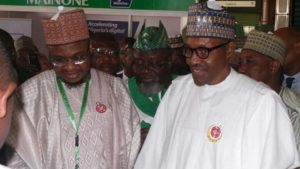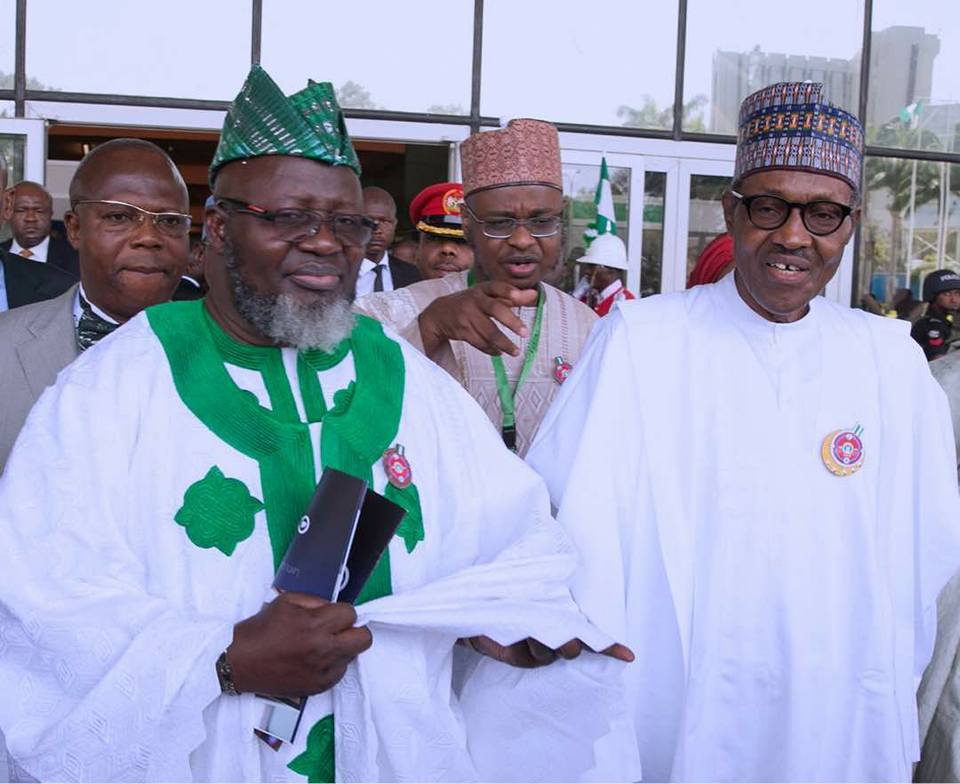By Aanuoluwa Omotosho and Oluwatobi Opusunju

DG of NITDA, Dr Isa Ali Ibrahim Pantami taking President Muhammadu Buhari on tour at eNigeria
Stakeholders at the just ended three-day eNigeria have called for a more aggressive approach in implementing the local content development policy even as they want rapid infrastructural deployment and capacity building to enhance the country ability to be part of the Knowledge Economy. While commending the National Information Technology Development Agency (NITDA) for its more frontal approach at implementing the local content policy, conference attendees said government through its ministries, departments and agencies (MDAs) needs to ensure compliance to the policy to help increase both patronage and capacity of indigenous ICT firms.
Attendees wants the creation and review of existing regulations for a more effective ICT sector in the country while expressing worries that “a whopping $2.8 billion is expended on the importation of hardware and software products and services annually to the country which had led to capital flight.”
The stakeholders appear to suggest that insists a more radical approach in reviewing existing regulations and implementation of executive orders as they concern local content would help checkmate the “huge and avoidable” capital flight in the ICT sector. MDAs must comply to patronize “Made-in-Nigeria” Information Technology (IT) products and services” in order to lead the campaign for a pro-local market.
The attendees noted that “the Nigerian economy is making digital transition which is evident from the sheer volume of online financial transactions in the country which stood at over N56 trillion in 2016, and204% increase in Internet transactions between 2014 and 2017 – from N5.41 billion to N16.45 billion.” But they want further investment in support infrastructure and regulations that reflect the increasing dynamics of the ecommerce sub-sector in order for the country to fully leverage the opportunities in the digital economy.
Part of the communiqué notes: “Digital economy is an important enabler of economic growth since digital skills and technologies have the capacity to boost the productivity of every nation with such skills and technologies projected to contribute $2 trillion to the global economy by 2020.” Below is the full communiqué as officially released by the NITDA. The eNigeria is Nigeria’s flagship international conference and Exhibition organised yearly by the NITDA – this year’s event was declared open by President Muhammadu Buhari.
DRAFT COMMUNIQUE OF THE e-NIGERIA 2017 CONFERENCE HELD FROM TUESDAY, 7TH – THURSDAY, 9TH NOVEMBER, 2017 AT THE INTERNATIONAL CONFERENCE CENTRE, ABUJA
PREAMBLE
1.0 The National Information Technology Development Agency (NITDA), an Agency of the Federal Ministry of Communications organized the 10th edition of e-Nigeria Conference and Exhibition from Tuesday, 7th – Thursday, 9th November 2016 at the International Conference Centre, Abuja. The theme of the Conference is ‘’Fostering Digital Economy through Local Content Development and Effective Regulations’’.
2.0 The eNigeria is Nigeria’s flagship international conference and Exhibition that brings stakeholders together in the IT industry to deliberate on emerging technologies, local innovation and relevant Information and Communication Technology (ICT) issues for the socio-economic development of the nation
3.0 The objectives of 2017 edition are to encourage indigenous ICT innovation management for national and economic development; position the nation to benefit from emerging technologies; articulate the imperatives of ICT for effective service delivery; outline a roadmap for national ICT skills development and identify entrepreneurial opportunities and regulatory challenges affecting Local Content promotion and adoption.
4.0 The opening ceremony was attended by eminent personalities which included the President and Commander-in-Chief of the Nigeria Armed Forces, His Excellency, Muhammadu Buhari, GCFR; the Honourable Minister of Communications, Barr. Abdur-Raheem Adebayo Shittu; Honourable Minister of Federal Capital Territory (FCT), Alhaji Muhammed Bello; Attorney General of the Federation and Minister of Justice, Abubakar Malami (SAN) represented by the Solicitor-General of the Federation, Mr. Dayo Apata; Permanent Secretary, representative of the Government of Estonia and the Director-General/Chief Executive, National Information Technology Development Agency (NITDA), Dr. Isa Ali Ibrahim Pantami, the host of the event.
5.0 Other dignitaries present included the Prof U Danbatta, Executive Vice Chairman, Nigerian Communication Commission (NCC), Dr Dan-Azumi Ibrahim, Director General/CEO, National Office for Technology Acquisition and Promotion (NOTAP) Executive Secretary, Petroleum Equalization Fund (PEF), Alhaji A. A.Boibboi; Managing Director/Chief Executive, Galaxy Backbone Plc, Mr. Yusuf Kazaure; the Vice Chancellor, Federal University of Technology, Gashua, Prof Andrew Haruna; Captains of Industries in the Information and Technology sector, Presidents of ICT related professional bodies such as NCS, CPN, ISPON and NGOs. A total of 2,597 participants from Nigeria and outside the country registered and attended the conference.
6.0 During the opening ceremony, the DG/CEO of NITDA, Dr. Isa Ali Ibrahim Pantami, gave the welcome address while the Hon. Minister of Communications gave his remarks. Various goodwill messages were delivered by the representatives of the Government of Estonia and Benue State Government. The Managing Director/CEO, Galaxy Backbone Plc; President, Institute of Software Practitioners of Nigeria; President, Nigeria Computer Society; Managing Director, Chams Ltd; President, African Information Technology Alliance; Vice Chancellor, Federal University of Technology, Gashua and Chairman of Teledom Group. The Honourable Attorney General and Minister of Justice, presented the keynote speech. The President and Commander-in-Chief of the Nigeria Armed Forces, Federal Republic of Nigeria, His Excellency, President Muhammadu Buhari, GCFR declared the conference open. He then led dignitaries on a tour of exhibition stands.
7.0 The conference consisting of Ten (10) Plenary sessions featured paper presentations, discussions by panelists as well as questions and answers.
8.0 Participants commended the continuous efforts of NITDA in the hosting of the International Conference most importantly in the choice of the theme and its focus to ensure the fostering of digital economy through local content.
In the course of the proceedings, participants noted:
i. The theme of the 2017 eNigeria conference was predicated on three segments of using ICT to reduce unemployment, enhance national security and promote ICT local content development through effective regulations;
ii. The efforts of NITDA on local content development, infrastructural deployment, capacity building as well as creation and review of existing regulations for effective ICT sector in the country;
iii. That in 2017, NITDA saved the sum of N2.5billion for the Federal Government of Nigeria through the IT Project Clearance initiative.
iv. ICT deployment in Nigeria is growing at a very high rate thus positioning the country as one of the fastest growing economies in sub-Sahara Africa, with the sector contributing about 12.58% to the GDP in 2017.
v.
vi. However, there is low patronage of Made-in-Nigeria ICT goods and services which resulted in considerable capital flight out of the country;
vii. The importance of a thriving Local Content Policy through ability to develop a “home-grown” digital economy which is dependent upon the development of ICT-capacity of Nigerians.
viii. The directive of the Federal Government of Nigeria for all Ministries, Department and Agencies (MDAs) to patronize “Made-in-Nigeria” Information Technology (IT) products and services;
ix. That the digital economy comprises economic activities resulting from the billions of online connections leading to increase in revenue, empowerment of citizens, reduction in corruption and the creation of jobs;
x. Digital economy is an important enabler of economic growth since digital skills and technologies have the capacity to boost the productivity of every nation with such skills and technologies projected to contribute $2 trillion to the global economy by 2020;
xi. The serious efforts of countries which experienced a high level economic growth through growing their digital economies;
xii. That the Nigerian economy is making digital transition which is evident from the sheer volume of online financial transactions in the country which stood at over N56 trillion in 2016, and204% increase in Internet transactions between 2014 and 2017 – from N5.41 billion to N16.45 billion.
xiii. The efforts of NITDA at collaborating with relevant government organisations such as the Bureau for Public Procurement (BPP); the Economic and Financial Crimes Commission (EFCC) and the Office of the Auditor-General of the Federation to ensure that the certificates issued are used to assess the level of compliance of IT projects;
xiv. The giant strides made by NITDA in the development of Rulemaking Process aimed at stakeholders participation in the development of regulations, policies, and guidelines;
xv. The concern that a whopping $2.8 billion is expended on the importation of hardware and software products and services annually to the country which had led to capital flight;
xvi. That IT plays a crucial role in the administration of Justice in Nigeria, worthy of note is the Cyber Crime Act 2015 which envisages a range of actions that may constitute crimes from the illegal use of Information Technology (IT) or the Internet and the Evidence Act 2011 which gives Information Technology (IT) Legislative Imprimatur while Section 84 of the Act identified electronic evidence as vital source of evidence in cases before Nigerian courts.
xvii. The existence of EdTech interventions by the Federal Government through agencies such as NITDA, NCC, USPF, NUC, TETFUND to deploy IT Infrastructure in educational institutions;
xviii. The need for equal opportunity in the education system for every eligible child to obtain quality education at any level irrespective of social and economic background;
xix. Lack of integrated health information system is a major hindrance to the growth of health sector in Nigeria and the huge health tourism budget in public sector is a conduit pipe for siphoning public funds
xx. As demonstrated in developed countries, personal identification is the foundation for a sustainable digital economy hence the need for data harmonisation in Nigeria is expedient.
xxi. Government efforts to achieve efficient data sharing service face challenges which include lack of defined processes, people buy-in and absence of compelling reasons to adopt the flow of data exchange.
xxii. The need to identify low-hanging fruits for gradual implementation in order to achieve the objectives of eNigeria 2017;
To foster digital economy through local content development and regulation, participants recommended as follows:
i. Government through NITDA and other stakeholders should continue to promote the required awareness on the need for MDAs to patronise indigenous IT products and services as well as the use of the .gov.ng domain for their websites in order to support the national e-government programme;
ii. All relevant Stakeholders in the ICT industry should as a matter of necessity engage the Federal Ministry of Justice on the promotion and use of technology in our judicial system;
iii. NITDA should continuously engage the Federal Ministry of Justice and the National Assembly for the review and strengthening of the NITDA Act through an executive amendment bill with more stringent punishment for violation of the NITDA Act or the regulations of NITDA.
iv. NITDA is urged to build strategic alliances aimed at ensuring that Nigeria domesticates and builds capacity in new and emerging technologies such as Artificial Intelligence (AI), Smart Technologies and the Internet of things (IOT) among others.
v. All stakeholders are encouraged to partner with NITDA on the need to ensure compliance with the Executive Orders of Government and the Guidelines for Nigerian Content Development in ICT 2013 for enhancement and guaranteed products and service delivery.
vi. The Federal Government through relevant stakeholders should ensure effective co-ordination of health services based on an integrated national ehealth database;
v. Stakeholders should work out efficient and effective partnership with development
partners for creation of access to affordable capital through a National ICT
Innovation Fund;
vii. The Federal Government through NITDA should categorize all digital assets in all MDAs in the country to assist in identifying and evaluating the risk assessment and appraisal of how best to secure the assets;
viii. NITDA’s IT clearance role should be used to encourage patronage of indigenous products especially by MDAs;
ix. NITDA should partner with Corporate Affairs Commission to ensure all local companies have a .ng domain while NITDA IT clearance should be a prerequisite before BPP clears any IT project;
x. That NITDAs role in the work of Presidential Enabling Business Environment Council (PEBEC) should be strengthened as IT is central to ease of doing business;
xi. A national workshop should be organised to review all existing IT Regulations and Laws in order to ensure a robust legal framework for Local Content and IT development in Nigeria
The Director-General/Chief Executive Officer, NITDA expressed his gratitude to all stakeholders and participants for the success of the 2017 eNigeria.
































